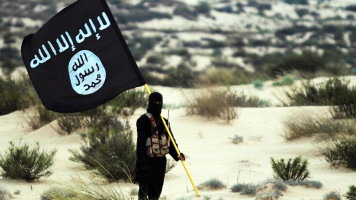'Economic war': Lebanese airforce offers helicopter tours in bid to boost morale, budget
Lebanon's air force officially began offering helicopter tours of the country on Thursday, in an ambitious—albeit unusual—attempt to raise funds for the struggling army.
"We are facing an unconventional, economic war—and we must face it using unconventional methods," General Ziad Haikal, Commander of the Lebanese Air Force (LAF) told a group of reporters gathered in Rayak air base on Thursday.
This war will not be fought with rifles and bombs, but rather, helicopter leisure rides for tourists.
"The army's purpose is to defend the homeland. Usually, we use weapons to fight, but now we are fighting an economic war and we must use all the tools available," Gen. Haikal said.
Tourists and Lebanese can now sign up for 15- minute helicopter rides through the army's website. The tours depart from both Rayak and Amchit airbase, and offer scenic views of the eastern Bekaa valley. Soon, the LAF will expand the tours to include aerial views of the heritage sites of Beit ed-Dine and Beit al-Qamer, where dynastic rulers once governed their fiefdoms.
Passengers will ascend in R44 Robinson helicopters, usually reserved for student pilots in their first year of training, with flight instructors.
The flights will cost $150—"cheaper than Vegas!" the commander said—and will generate about $300 of net revenue an hour after accounting for operating costs. The LAF is aiming for about 1,000 hours of leisure flights this year, meaning the program could net the military $300,000 by year's end.
The program comes amidst a worsening economic crisis which the World Bank has deemed to be one of the "top three" crisis episodes since the 1850s. The Lebanese Lira has plummeted since the beginning of the crisis in fall 2019, losing over 90% of its value.
We’re not sitting here twiddling our thumbs, we're working and we can help ourselves. We want to deliver a message: We are doing the impossible and standing on our feet
The effect on the military is particularly jarring, as soldiers have seen their monthly salaries fall to as low as $90. International powers have long seen the Lebanese military as a stabilising influence on a country with a history of sectarian fighting.
In an attempt to help alleviate the military's financial stress, France organised a fundraising conference in mid-June where it asked participating countries to donate fuel, food and medical supplies. Several countries pledged to assist, but the pledges contained little in the way of specifics.
To that end, Gen. Haikal said that the program was also meant to boost the morale of struggling soldiers. "You can’t blame anyone for trying to survive, and we are in a survival battle now," he said.
The program was also directed at the international community upon which the Lebanese military heavily depends. The LAF received $2 billion from the US alone in the last 15 years.
"We’re not sitting here twiddling our thumbs, we're working and we can help ourselves. We want to deliver a message: We are doing the impossible and standing on our feet," the commander said.






 Follow the Middle East's top stories in English at The New Arab on Google News
Follow the Middle East's top stories in English at The New Arab on Google News

![Beirut stadium [Getty]](/sites/default/files/styles/image_330x185/public/1235817272.jpeg?h=a5f2f23a&itok=0UZr2fIL)
![Israeli forces destroyed a religious shrine in the village of Shama in southern Lebanon [Getty]](/sites/default/files/styles/image_330x185/public/2184560625.jpeg?h=a5f2f23a&itok=Ge_H4GfP)